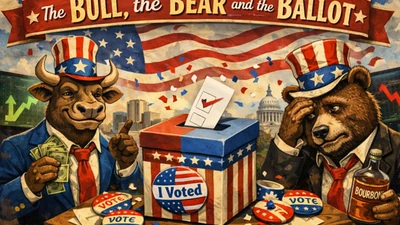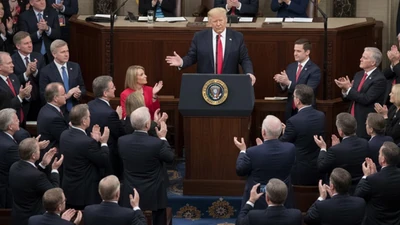The franchise industry is thriving, and from a conservative perspective, it’s a shining example of what makes America great: individual grit, free enterprise, and a rejection of government handouts. While the left frets over tariffs and trade wars, franchising stands tall as a $900 billion juggernaut—per the International Franchise Association (IFA)—employing nearly 9 million Americans. It’s not just fast food joints like McDonald’s or Dunkin’ anymore; it’s gyms, home services, and even boutique pet care. For conservatives, this isn’t just business—it’s a blueprint for prosperity that proves the private sector, not Washington, drives real growth. Let’s dive into why the franchise industry is a conservative triumph and what’s fueling its rise.
Self-Reliance Over Socialism
At its core, franchising embodies the conservative ethos: you don’t wait for a bureaucrat to save you—you roll up your sleeves and build something. Franchisees aren’t pampered corporate drones; they’re entrepreneurs who invest their own money—often $100,000 to $1 million—into a proven system. The IFA reports over 800,000 franchise establishments nationwide, each one a testament to risk-taking and reward. Contrast that with the left’s obsession with welfare and “guaranteed” jobs. Conservatives know true dignity comes from ownership, not handouts, and franchising delivers that in spades—whether it’s a veteran opening a UPS Store or a family flipping burgers at Five Guys.
Jobs, Jobs, Jobs—Without the Red Tape
The franchise model is a job-creation machine, and it does it the conservative way: organically, not through bloated stimulus bills. Those 9 million jobs span every state, from rural Texas to urban Ohio, often in communities the coastal elites ignore. X posts from franchise owners highlight hiring surges—think 20-30 workers per new location—without needing a dime from Uncle Sam. Why? Because franchisors provide training and systems, letting small-business owners sidestep the regulatory quicksand that strangles startups. Conservatives cheer this: less government meddling, more private-sector solutions. Compare that to Biden-era flops like the Green New Deal, which promised jobs but delivered deficits. Franchising proves markets beat mandates every time.
Tariffs? A Bump, Not a Bust
Trump’s tariffs—10% on all imports, 25% on Canada and Mexico—have the chattering class clutching pearls, but the franchise industry shrugs. Sure, supply costs for imported beef or equipment might nudge up franchisee expenses—X chatter pegs it at a 3-5% hike for some chains. But conservatives see the upside: domestic franchisors like Chick-fil-A or Ace Hardware can lean harder into U.S. suppliers, keeping dollars here. Plus, the industry’s built for adaptation—franchisees tweak menus or pivot services faster than corporate giants. The left cries “crisis”; conservatives call it resilience. Tariffs might even spark a wave of made-in-America franchises, cutting reliance on foreign goods—a win for national sovereignty.
A Bulwark Against Woke Excess
Big corporations bow to woke dogma—think Disney’s pronoun police or Nike’s sermonizing ads—but franchises often stay grounded. Why? They’re local. A Subway owner in Alabama isn’t beholden to San Francisco’s DEI czars; they answer to customers who want value, not lectures. The IFA’s 2024 data shows franchise growth strongest in red states—Texas, Florida, Georgia—where common sense still reigns. Conservatives relish this: franchising’s decentralized nature keeps it tethered to Main Street, not Wall Street’s ESG circus. It’s capitalism with a backbone, not a kneel.
Challenges? Sure, But Freedom Prevails
It’s not all rosy. Rising interest rates—thanks to Fed hikes—make franchise loans pricier, and labor shortages pinch hiring. X posts from franchisees grumble about $15-an-hour wages just to snag a cashier. But conservatives don’t flinch. These are market signals, not failures—franchisees innovate with tech (self-order kiosks) or leaner staffing. Government “fixes” like minimum-wage hikes or debt forgiveness would only distort the equation. The industry’s growth—up 2.5% in 2024 despite headwinds—proves it can handle tough times without a bailout. That’s the conservative way: sink or swim, no nanny state required.
The Franchise Future: A Conservative Rallying Cry
Franchising isn’t just surviving; it’s thriving because it aligns with timeless conservative principles—self-reliance, local control, and faith in the individual over the collective. It’s a $900 billion rebuke to socialism, showing that opportunity still flows from hard work, not handouts. For investors, it’s a safe harbor: steady returns (5-10% annually for many brands, per Franchise Business Review) in a volatile world. For communities, it’s a lifeline: jobs and pride in places the left forgot.
Trump’s America-first policies—tariffs included—only amplify this. Franchises don’t need globalism’s crutches; they build wealth block by block, town by town. Conservatives should champion this industry not just as an economic force, but as a cultural one—a middle finger to the elites who’d rather tax us into submission than let us rise on our own terms. The franchise boom isn’t just good business; it’s the American Dream in action. And that’s worth rooting for.










